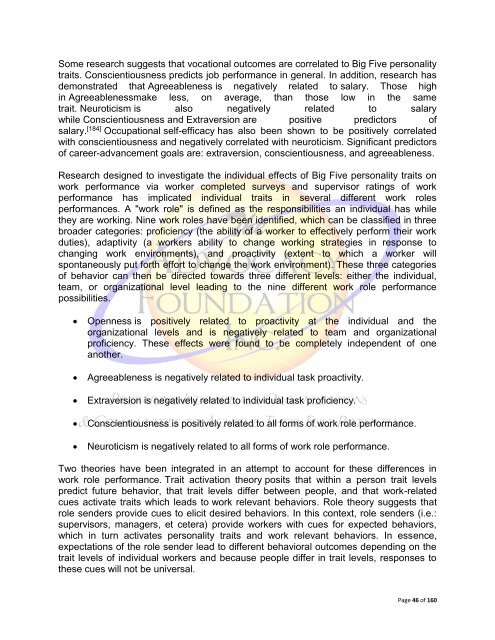The Gift of Introversion
The Gift of Introversion
The Gift of Introversion
Create successful ePaper yourself
Turn your PDF publications into a flip-book with our unique Google optimized e-Paper software.
Some research suggests that vocational outcomes are correlated to Big Five personality<br />
traits. Conscientiousness predicts job performance in general. In addition, research has<br />
demonstrated that Agreeableness is negatively related to salary. Those high<br />
in Agreeablenessmake less, on average, than those low in the same<br />
trait. Neuroticism is also negatively related to salary<br />
while Conscientiousness and Extraversion are positive predictors <strong>of</strong><br />
salary. [184] Occupational self-efficacy has also been shown to be positively correlated<br />
with conscientiousness and negatively correlated with neuroticism. Significant predictors<br />
<strong>of</strong> career-advancement goals are: extraversion, conscientiousness, and agreeableness.<br />
Research designed to investigate the individual effects <strong>of</strong> Big Five personality traits on<br />
work performance via worker completed surveys and supervisor ratings <strong>of</strong> work<br />
performance has implicated individual traits in several different work roles<br />
performances. A "work role" is defined as the responsibilities an individual has while<br />
they are working. Nine work roles have been identified, which can be classified in three<br />
broader categories: pr<strong>of</strong>iciency (the ability <strong>of</strong> a worker to effectively perform their work<br />
duties), adaptivity (a workers ability to change working strategies in response to<br />
changing work environments), and proactivity (extent to which a worker will<br />
spontaneously put forth effort to change the work environment). <strong>The</strong>se three categories<br />
<strong>of</strong> behavior can then be directed towards three different levels: either the individual,<br />
team, or organizational level leading to the nine different work role performance<br />
possibilities.<br />
<br />
<br />
<br />
<br />
<br />
Openness is positively related to proactivity at the individual and the<br />
organizational levels and is negatively related to team and organizational<br />
pr<strong>of</strong>iciency. <strong>The</strong>se effects were found to be completely independent <strong>of</strong> one<br />
another.<br />
Agreeableness is negatively related to individual task proactivity.<br />
Extraversion is negatively related to individual task pr<strong>of</strong>iciency.<br />
Conscientiousness is positively related to all forms <strong>of</strong> work role performance.<br />
Neuroticism is negatively related to all forms <strong>of</strong> work role performance.<br />
Two theories have been integrated in an attempt to account for these differences in<br />
work role performance. Trait activation theory posits that within a person trait levels<br />
predict future behavior, that trait levels differ between people, and that work-related<br />
cues activate traits which leads to work relevant behaviors. Role theory suggests that<br />
role senders provide cues to elicit desired behaviors. In this context, role senders (i.e.:<br />
supervisors, managers, et cetera) provide workers with cues for expected behaviors,<br />
which in turn activates personality traits and work relevant behaviors. In essence,<br />
expectations <strong>of</strong> the role sender lead to different behavioral outcomes depending on the<br />
trait levels <strong>of</strong> individual workers and because people differ in trait levels, responses to<br />
these cues will not be universal.<br />
Page 46 <strong>of</strong> 160

















